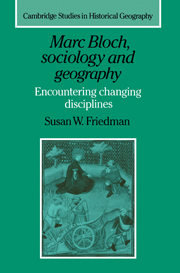Book contents
- Frontmatter
- Contents
- List of tables
- Acknowledgments
- A note on translation
- List of abbreviations
- Introduction
- 1 Marc Bloch and the “Université”
- PART I Sociology, geography, and history during Marc Bloch's years of apprenticeship
- PART II Marc Bloch as a critic and practitioner of sociology and geography
- 6 The University of Strasbourg as a center of disciplinary change
- 7 Kings, serfs and the sociological method
- 8 Reflections on the geographical approach and on the agrarian regime
- 9 An expanding view: Marc Bloch's later projects
- 10 Towards a reworking of the historiography of Marc Bloch
- Notes
- Index of names
- Subject index
- Cambridge Studies in Historical Geography
9 - An expanding view: Marc Bloch's later projects
Published online by Cambridge University Press: 23 November 2009
- Frontmatter
- Contents
- List of tables
- Acknowledgments
- A note on translation
- List of abbreviations
- Introduction
- 1 Marc Bloch and the “Université”
- PART I Sociology, geography, and history during Marc Bloch's years of apprenticeship
- PART II Marc Bloch as a critic and practitioner of sociology and geography
- 6 The University of Strasbourg as a center of disciplinary change
- 7 Kings, serfs and the sociological method
- 8 Reflections on the geographical approach and on the agrarian regime
- 9 An expanding view: Marc Bloch's later projects
- 10 Towards a reworking of the historiography of Marc Bloch
- Notes
- Index of names
- Subject index
- Cambridge Studies in Historical Geography
Summary
Following Marc Bloch's move to Paris in 1936, much of his time was taken up by projects begun sometime before. It was a time of multiple commitments and unfinished business. Not only had he promised several volumes to Berr's series, “L'Evolution de l'Humanité,” he was also now responsible for directing and contributing to his own series, “Le Paysan et la Terre.” His new position in the chair of Economic History at the Sorbonne further restricted the kinds of work he could undertake. As he pointed out to Febvre, he would be forced at the Sorbonne to leave aside interests that did not fit neatly under the label of social history. This would include some of his more politically oriented work such as that on the rois thaumaturges and on l'idée de l'Empire. As he confided to Febvre, “One of my preoccupations is to see how I will be able, on occasion, to reintroduce these things; and for the time being I certainly won't speak of this to others than you.” The disruption of the Second World War meant that several of these later projects would remain unfinished. Nevertheless, during the many idle moments which the war also brought, Bloch had time to reflect and write on the nature of history, grappling yet again with issues in the pre-war debates between historians, sociologists, and geographers – in a work which would also never be completed.
- Type
- Chapter
- Information
- Marc Bloch, Sociology and GeographyEncountering Changing Disciplines, pp. 152 - 172Publisher: Cambridge University PressPrint publication year: 1996

